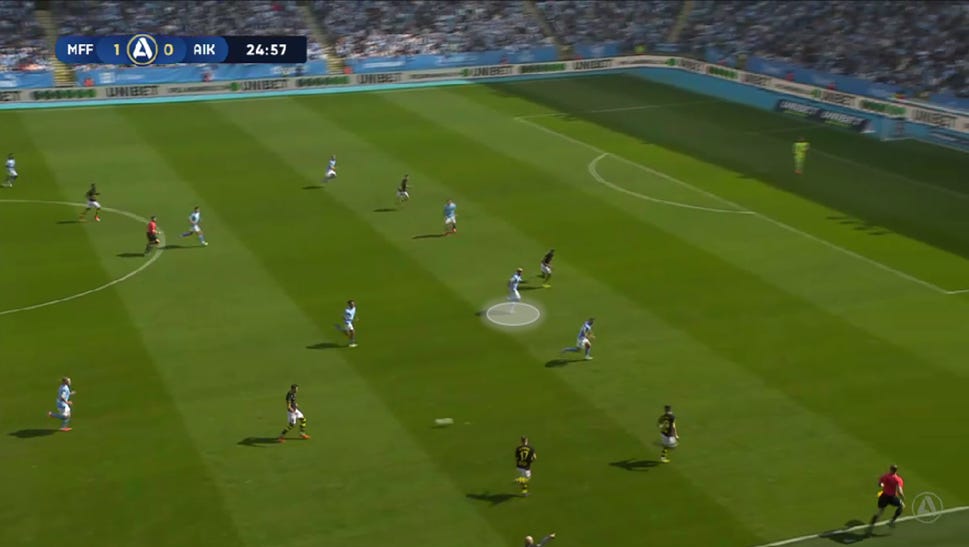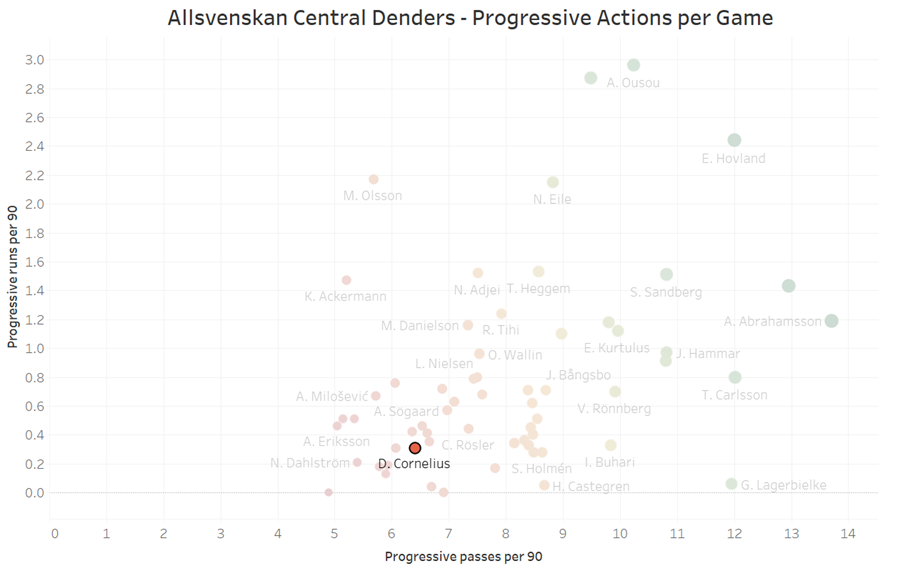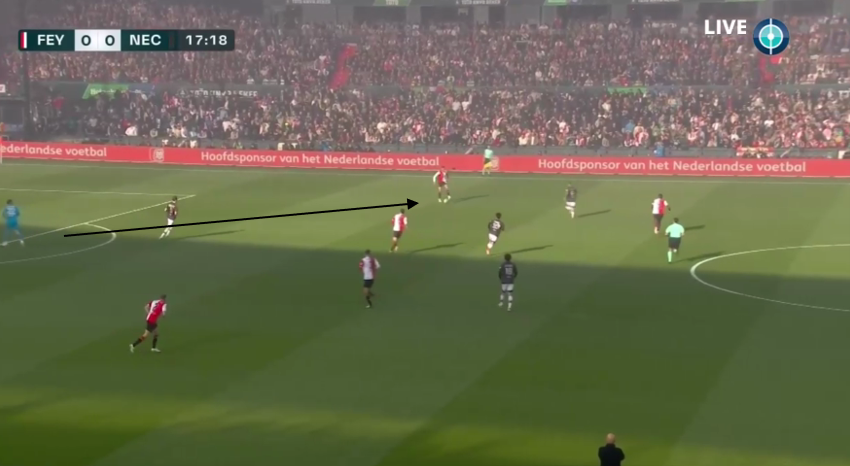Derek Cornelius is hot property. Coming off the back of a hugely impressive debut campaign in Swedish football, he has taken further steps forward at the beginning of his sophomore year. With two titles already under his belt since joining Malmö FF in early 2023, he could soon be ready for another move to a bigger league, with a host of clubs such as Ajax and Feyenoord reportedly interested.
Who is he?
Born in Canada to Caribbean parents, from Barbados and Jamaica respectively, Derek Cornelius relocated to Germany and Lübeck at the tender age of 16 to pursue his dream of playing professional football. He started off in the regional leagues with Lübeck and Neumünster before taking the step over to Serbian football, joining top division side FK Jabor Ivanjica to get his first taste of top-flight football. Before turning 20, he was a regular starter and getting well-deserved attention back in his native Canada. MLS side Vancouver Whitecaps quickly secured his signature, however he struggled to make any real impact in the North American top-flight. As such, he was loaned out to Greek Super League mid-table side Panetolikos, where he really made a name for himself and became hugely appreciated through his stellar and fearless performances. These are really what earned him his move to Swedish powerhouse Malmö FF ahead of last season, where he has kept progressing since, ultimately winning the league in 2023. Going from strength the strength, his second title at the club was secured only days ago, beating Djurgården in the Swedish Cup final.
He is now one of the absolute best players, not just defenders, in the Swedish Allsvenskan. Rumours are circulating about much larger clubs tracking him closely, meaning he could be looking at a big-money move in the summer. Malmö have an incredibly strong economy by Swedish measures, consistently competing in European competitions over the last decade, including three Champions League group stage appearances. Therefore, they are in no need to sell, but could be convinced to let go of their defensive colossus with an offer too good to turn down, likely around the €10m mark.
What does he do well?
Derek Cornelius is a physically imposing central defender who has an overall impressive defensive profile. He reads the game well and is proactive in dealing with situations, not giving attackers any time on the ball, using his strength and speed to good effect to neutralise them. His duelling is one of his main strengths, being incredibly powerful in ground duels and well-timed in his tackle attempts. Similarly, he has the timing, height and strength to be dominant aerially, standing 188cm tall and weighing in the region of 90kg.
He steps up to put pressure on attackers early, using his physical characteristics to either get in the back of a receiving striker or arrive at speed before they even have time to complete their first touch. His sharp awareness also means he is able to cover space, reading passes in behind the defence and dropping proactively to get a head start on opponents, even those travelling at speed. With an interception rate of 6.88 per match in 2024, only seven other Allsvenskan defenders have won back possession back more often through cutting out passes, crosses and shots. More impressively, this is combined with conceding the 7th least fouls, further enforcing his great timing in stepping into situations. Such a quality is invaluable in a central defender, breaking up play early and not giving away free kicks. His positional sense is intuitive, regularly being in the right place to intercept crosses and passes into the penalty area. With a knack for realising when to disconnect from opponents and focus on adjusting his position adequately, Cornelius tends to be in the right place at the right time.
In the situation above, he lets the AIK striker run behind him, knowing he is offside. Instead, he holds the defensive line and readjusts to cover the nearest part of the penalty area when the ball is played out wide, thus able to effortlessly head away the ensuing cross. This is a common theme in games, consistently winning headers and getting a foot in for low crosses to avert danger by being in the right position.
This season he has taken a step up in terms of his defensive game, although it is worth mentioning we are at the time of writing only seven matches into the Allsvenskan campaign. He is more settled in the team compared to last season and it really shows.

Cornelius ranks in the top six for central defenders for both defensive duels and aerial duels won, whereas last year he profiled more as an average Allsvenskan center back in terms of duelling. Playing for a dominant side certainly helps, but he is also a big part of that overall team improvement. In addition, he is the defender with the third-most successful defensive actions per game, showing what a giant he has been at the back.
It was telling that Malmö suffered their first league defeat of the season in round 7 when Cornelius missed out, losing 3-1 to Elfsborg. In the six previous matches, with Cornelius starting, they only conceded a single goal, highlighting his importance to the defensive stability of the side.
Where can he improve?
While Derek Cornelius is incredibly impressive on the defensive side of the game, there are some question marks regarding his ability on the ball. In last season’s Allsvenskan he ranked in the 22nd percentile in terms of progressive actions, meaning 88% of central defenders had more combined forward runs and passes per game than him. This has increased to the 40th percentile in 2024 which remains on the lower side for a starting player on the best team in the division. At Malmö, he has Premier League veteran Pontus Jansson next to him, who is incredibly comfortable in possession and takes care of getting the ball up the pitch. However, such limitations on the ball are a cause for concern for possession-oriented teams who would want to be able to rely on both sides of the defence to build play.
While he is adequate, but by no means outstanding, in terms of his short passing, his long passing is a clear weakness. He does not even attempt to switch play and rarely plays long passes in general, but when he does, the success rate is relatively low. Last season, he only played 3.07 long passes per game, of which many are clearances, with a success rate of 48.72%, one of the worst completion rates in the division. That number has increased to 54.55% this year, which can still see plenty of room for improvement.
Due to his size and wide frame he is not particularly agile, struggling to move smoothly to twist, turn and keep up with tricky opponents. His footwork is solid, as well as having the correct side-on body shape when defending in 1v1 situations, but being a big and heavy player means he is not able to turn particularly quickly. In addition, as touched on previously, his aggressive nature gets him plenty of tackles and interceptions, but there are also times when he dives in unnecessarily and can get overplayed by clever touches around the corner by attackers. For the most part, however, he does win the ball in these situations, or disrupts the opponent sufficiently to unsettle them.
What’s next?
What we can conclude about Derek Cornelius is that he is most certainly ready for a step up in competition, now being dominant in a lower European league like Allsvenskan. Whether that is to a team looking to compete for the Eredivisie title remains to be seen. While he has some appealing characteristics, his in-possession flaws might be an issue if being tasked with building up, especially under pressure. There will likely be an adjustment period before he is able to fully settle at a higher level, but his experience playing all around Europe as well as a demonstrated ability to learn and adjust to various environments is likely to help. As a left-footed central defender, it is questionable whether Ajax really need him, considering the young prospects of Jorrel Hato, Gastón Ávila and Ahmetcan Kaplan are already in the ranks. Maybe he would be more suitable to be recruited by Feyenoord to in time replace David Hancko, who is being tracked by some of the biggest clubs in the world. Hancko is more comfortable on the ball, so a small shift in style may be required, while Cornelius stands out defensively compared to the Slovak.
It is clear to see that they are two different types of players. On the defensive side, the Canadian is more assertive. He wins more duels, both on the ground and aerially, as well as being much more active, completing over 72% more defensive actions per game. His interceptions (here adjusted for possession for a more even comparison), as touched on earlier, really stand out too. They are in fact a big reason for the higher volume in terms of successful defensive actions overall. It should however be noted that Cornelius comes up against worse opponents overall than Hancko does in the Eredivisie, and it remains to be seen how he can handle tougher attackers than those in playing in Sweden.
Conversely, Hancko is a better player on the ball, being more confident in playing long passes and switches of play from the left side of defence. Having said that, his success rate is relatively low at 50.79%, but watching him play gives the impression of a much more accomplished long passer based on both technique and execution. In addition, he will regularly play forward passes to break opposition lines, both up the left wing and into midfielders centrally. His higher progressive pass statistics, both attempting and completing these valuable forward passes more regularly, attest to this. Having played a small number of games at left-back is likely to have boosted his progression numbers somewhat, especially in terms of runs, nonetheless these differences between the two players are quite significant. Hancko regularly shows why he is coveted by European giants with his composure and sensibility in possession, looking to dictate and control build-up. Meanwhile, Cornelius prefers to keep it simple, allowing others to get the ball up the pitch for his team.
One reason for his limitations in possession is the way he controls the ball. When receiving in situations like the one above, he has the chance to fully open up his body to create more forward passing options and better angles, both out wide but also short to his left and possibly up to one of the strikers if they make a move to receive. Instead, he simply stops the ball dead, meaning he is forced to play a simple and safe pass across to his central defensive partner due to a lack of better options.
His uncomfortable nature with the ball at his feet means he struggles to build up adequately. He never looks completely settled in possession, not manipulating the ball well enough neither with his first touch nor his dribbling, leading to closing his angles and often resorting to the easiest option possible.
In comparison, David Hancko dictates play elegance and is surprisingly agile for his size. When receiving, he looks to play forward, directing his first touch in order to open up the pitch and create more passing options.
In the image above, the goalkeeper has passed him the ball. He has checked over his shoulder and then turned close to 180 degrees to be able to play a high, progressive pass down the line. This is something which Cornelius simply does not do, and probably isn’t even capable of, due to his lack of agility.
Final Thoughts
Whether Feyenoord will consider a change in style on the left side of central defence remains to be seen, but one thing is for sure; Derek Cornelius can take the step up to the next level and become a top defensive player in the division. As long as he is paired with a ball-playing central defender, very little should put off the best Dutch teams from recruiting him. If Hancko remains at the club past the summer, there could even be a possibility of forming a left-footed central defensive partnership there for a time, with the Slovak being comfortable on his right foot too. Ajax would demand even more of Cornelius than their rivals from Rotterdam, but he may be an option to offer something different centrally in a back three and really shore up that leaky defence. In fact, joining them would be somewhat of a full-circle moment, having been born in Ajax, Ontario.









